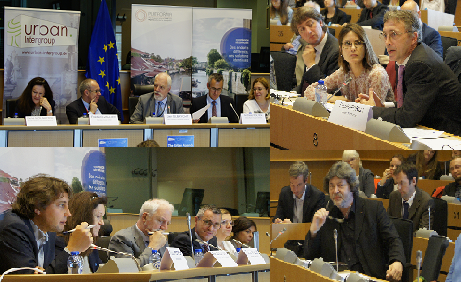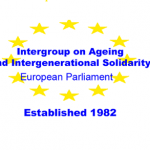Last issue of the URBAN newsletter
We are very pleased to present you the URBAN Intergroup 21th Newsletter in which you will find more information about the breakfast meeting with coordinators of 12 partnerships of the URBAN Agenda.
In this issue you can read as well about other recent meetings and events organised by the URBAN Intergroup.
Enjoy your reading.
EIB’s emerging response to the Urban Agenda – meeting in Strasbourg on September 15th
ing in Strasbourg on september 15th Last meeting of the URBAN Intergroup at the European Parliament in Strasbourg on Thursday September 15th, was devoted to the presentation of the European Investment Bank’s emerging response to the Urban Agenda.
Last meeting of the URBAN Intergroup at the European Parliament in Strasbourg on Thursday September 15th, was devoted to the presentation of the European Investment Bank’s emerging response to the Urban Agenda.
At the beginning of the meeting, Gerry Muscat, Head of Urban Development Division, stressed that the European Investment Bank (EIB) actively participated in the consultations of the Pact of Amsterdam. He explained that the Urban Agenda constitutes “a set of principles” which guides the EIB lending for cities, “a framework” to help the EIB providing better urban financing and advice and “a stimulus” to focus the EIB attention on urban issues.
Moreover, it has been recalled that in the Pact of Amsterdam, Ministers invite the EIB to help develop better funding approaches in the urban context, contribute to the partnerships (especially better funding and better knowledge), and to reflect – where relevant – the outcomes of the Urban Agenda for the EU in its urban lending, grant-loan blending and advisory services.
Norms and standardisation in relation to cities – meeting in Strasbourg on July 7th
 During the last meeting of the URBAN Intregroup, which took place in Strasbourg on 7 July, Mr Hilmar von Lojewski from the German Association of Cities, raised the issue of norms and standardisation in relation to cities.
During the last meeting of the URBAN Intregroup, which took place in Strasbourg on 7 July, Mr Hilmar von Lojewski from the German Association of Cities, raised the issue of norms and standardisation in relation to cities.
In the introduction, he shortly explained what is a standard and what does standardisation mean. He stressed at the same time that standardisation is not only a technical issue but political as well. Moreover, standards attempt to be compulsory. Example of standard “sustainable development in communities” and standards on Smart Cities showed that very often European indicators such as The Reference Framework for Sustainable Cities (RFSC) or global indicators like those linked to Sustainable Development Goals are not taken into account. During the discussion it has been mentioned that differentiation between standards for products and services is needed as soon as standards have impact on public budget.
In conclusion, participants agreed that careful monitoring of standardisation processes in relation to cities is needed and standards should be understood from the political perspective. MEPs stressed that in the near future, it will be necessary to check the indicators for example (Which kind of indicators do we use? Are they European? Do they take into account SDGs?), while the EC will present a performance based budget.
Norms and tandarisation in relation to cities- Hilmar von Lojewski’s presentation
The Refernec Framework for Sustainable Cities (RFSC)
HABITAT III – discussion about the role of European local and regional authorities
 Each national delegation has to include a local or regional government representative during Habitat III’s final conference in Quito this autumn. Together, the representatives of the future Slovak presidency, the European Parliament and the Commission have aligned with CEMR and PLATFORMA’s position, presented during the seminar co-organised with the URBAN intergroup on 21 June at the European Parliament.
Each national delegation has to include a local or regional government representative during Habitat III’s final conference in Quito this autumn. Together, the representatives of the future Slovak presidency, the European Parliament and the Commission have aligned with CEMR and PLATFORMA’s position, presented during the seminar co-organised with the URBAN intergroup on 21 June at the European Parliament.
While the seminar was taking place, preparations were already under way for the final conference in Quito (Ecuador), where the new Global Urban Agenda should be adopted. The European Commission representative (DG REGIO) Judit Torokne Rozsa supported the idea of having a local government representative in each national delegation. This idea was strongly endorsed by the Member of the European Parliament (MEP) and President of the URBAN intergroup Jan Olbrycht, who stated:”Let’s fight together for a greater role for local governments.” “We do not want one level to decide for everyone. Local and regional governments have to show the way”, confirmed Elena Szolgayová, representing the future Slovak presidency of the Council of the EU (SKLEU2016). “It is our ambition to support you”. As such, the Deputy Mayor of Cologne, Andreas Wolter, stated: “The European Union needs to support the demands of the Global Taskforce for local and regional governments (GTF) for the recognition of a special status for local governments within the governing bodies of the United Nations and UN Habitat.
The Quito conference is a good thing – but what comes next?
“The Quito conference will not be limited to a simple approval of the agreement by states”, explained the representative of Habitat III, Tobias Kettner. “If it’s true that it will lay the foundations for a new Global Urban Agenda, Quito will also be the opportunity to focus on the action and implementation of the Agenda.” To which CEMR Secretary General, Frédéric Vallier, replied: “With only a few months to go before the conference, our concerns are not only to know who will be responsible for what, but to see how national governments, towns, cities and civil society can work together once the agreement is signed.”
The representative from the NGO Habitat for Humanity, Deepali Sood, pointed out the importance of including citizens and stressed the need to assess the results throughout the process.
Speaking from the floor, MEP Ernest Maragall, member of the URBAN Intergroup, expressed his fears that the agreement might be “kidnapped by national governments”. These words were echoed by another member of the Intergroup MEP Joachim Zeller, who stated: “We do not need yet another agreement written by national governments. The risk we run is that that the whole point of the agreement could be lost; it’s an agreement that concerns urban life, which means towns and cities.”
The director of PLATFORMA, Patrizio Fiorilli, ended the seminar by putting forward several proposals included in PLATFORMA and CEMR’s joint declaration. The main proposals are the following:
- Giving a seat to local and regional governments at the UN process negotiations table;
- Guaranteeing a minimum of at least 20% of national resources to local government;
- Responding to the specific concerns of cities of all sizes and functional areas;
- Supporting co-operation among cities and regions through peer-to-peer capacity building projects and exchange of good practices, both within and outside of Europe;
- Designing the new Urban Agenda in close cooperation with local authorities and constituting a tool for self-assessment on a voluntary basis.
All eyes are now turned to national governments, as they will be the ones to decide on the final agreement.
Habitat III – Tobias Kettner’s presentation
Right to the City to older persons – meeting in Strasbourg on May 12th
The Joint meeting of the URBAN Intergroup and the Intergroup on Active Ageing and Intergenerational Solidarity took place on Thursday May 12th at the European Parliament in Strasbourg.
The main point of the meeting was the discussion on how to apply the Right to the City to older persons and seizing the opportunity of the EU Urban Agenda. Ms Julia Wadoux, policy and project coordinator for Health, New Technologies and Accessibility at AGE Platform Europe presented a broad picture of ageing in the EU, especially in the context of urbanisation. It has been stressed that according to the World Health Organisation (WHO), the adaptation of physical and social environments to the needs of the ageing population empowers people to age in better physical and mental health. It also promotes their social inclusion and active participation as well as helps them maintain their autonomy and a good quality of life. Moreover, WHO’s “8 areas of age-friendly environments in city” was quickly presented. During the presentation, the problem of age stereotypes and discrimination of old people in society was linked to the right to the city to older persons. The need for solidarity between generations and monitoring ageing has been stressed.
During the discussion, participants agreed that the EU Urban Agenda is a key opportunity for cities to design their age-friendly social and physical environments. MEPs underlined that ageing should be horizontally presented in different partnerships. However, it seems that actually the problem of mobility is central, not only in urban but especially in rural areas. Access to transport would allow older people social inclusion, improve health care, etc.
In conclusions, participants agreed that, in the short term, European and national policies could help to resolve some problems for older people leaving not only in cities. Moreover, long term investments are needed: for example pro-nativity policies to try to stop the consequences of ageing European pollution.
Appying the Right to the City to older persons-Julia Wadoux’ presentation
WHO Global Age-friendly Cities: A Guide
The Covenant on Demographic Change
Towards Smart, Sustainable and Inclusive Places for All Ages
Towards an age-friendly EU by 2020: From theory to local practice
Shaping Ageing Cities – 10 European case studies





